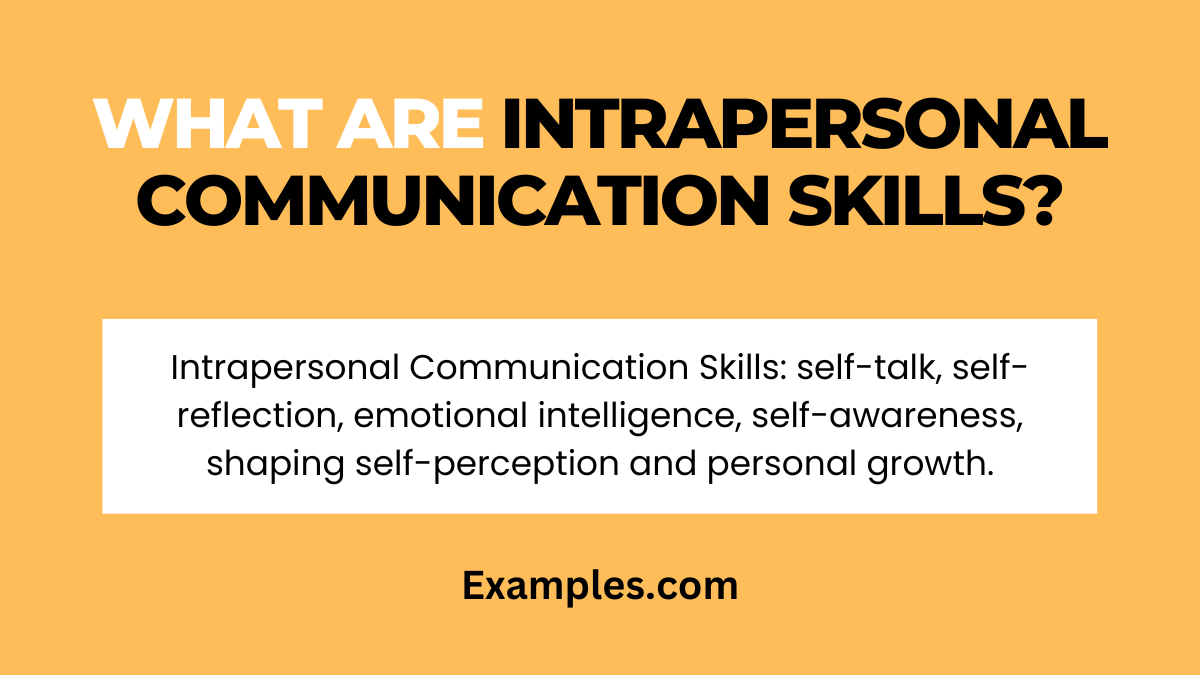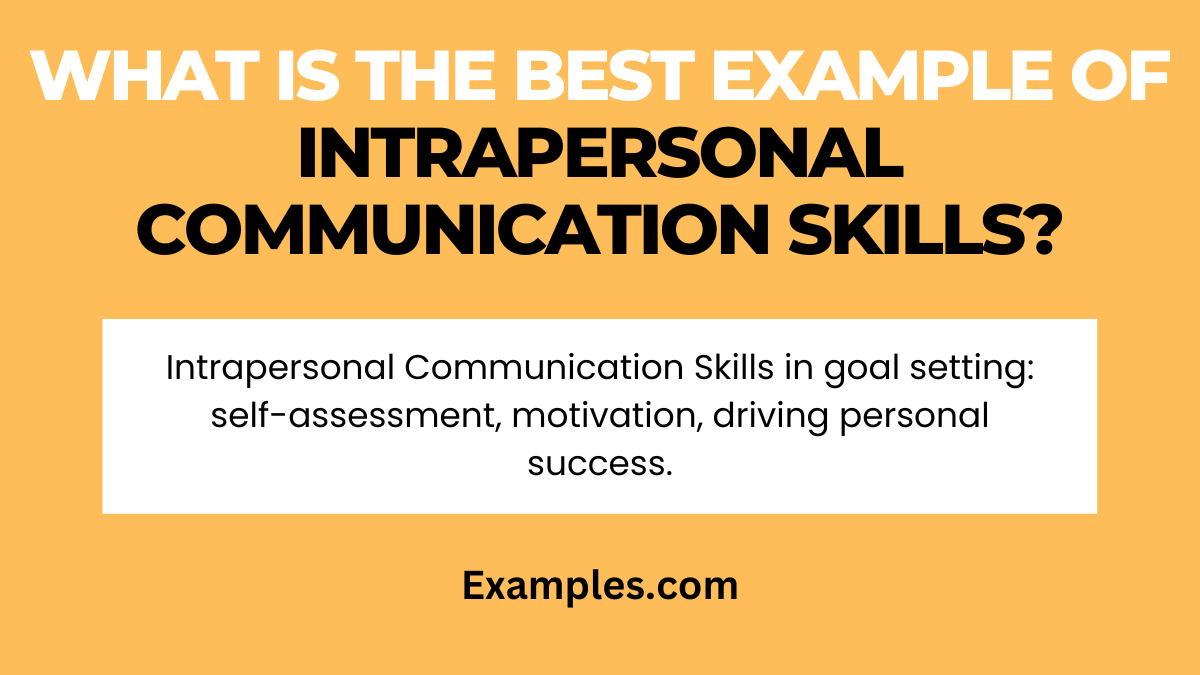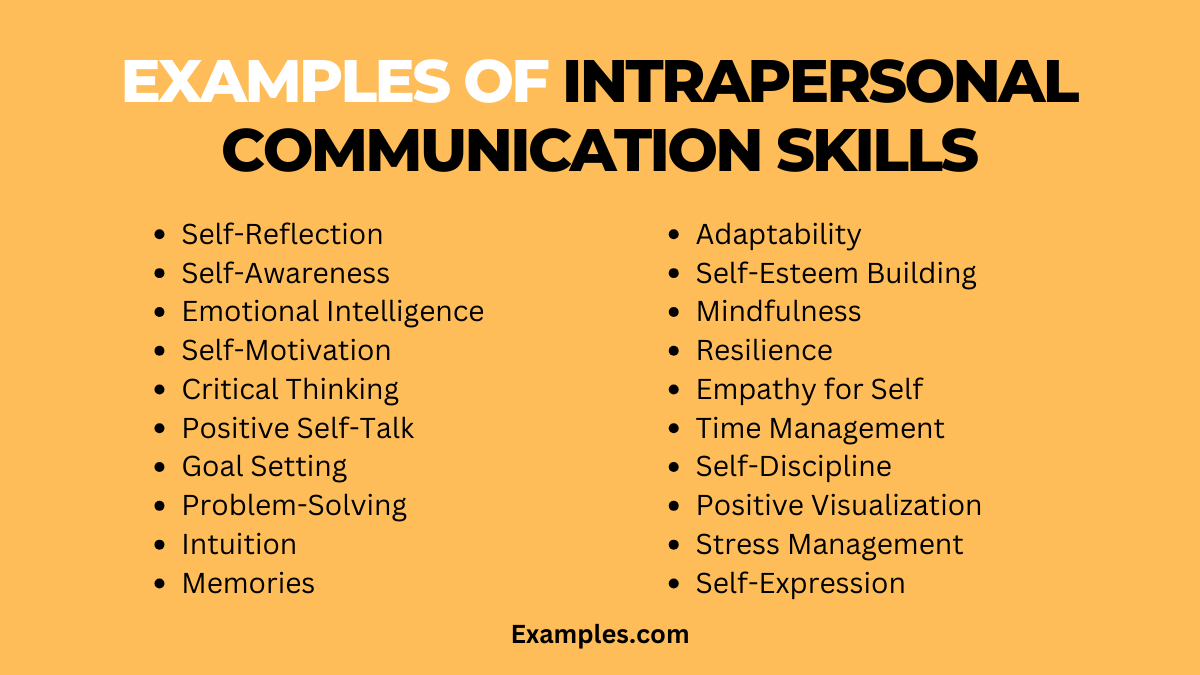19+ Intrapersonal Communication Skills Examples
Intrapersonal Communication Skills are essential tools for self-awareness, personal growth, and effective decision-making. These skills involve the ability to conduct an insightful and constructive inner dialogue, understand one’s own emotions, and reflect on personal beliefs and values. Mastering intrapersonal communication is key to developing a stronger sense of self, setting realistic goals, and navigating life’s challenges with greater clarity and confidence.
What are Intrapersonal Communication Skills?

Intrapersonal Communication Skills refer to the competencies required for effective self-talk and internal dialogue. These include self-reflection, self-awareness, emotional intelligence, and the ability to analyze and understand one’s thoughts and feelings. These skills are crucial for personal development, as they influence how individuals perceive themselves and their interactions with the world around them.
What is the Best Example of Intrapersonal Communication Skills?

A prime example of Intrapersonal Communication Skills in action is the process of goal setting and self-motivation. For instance, when an individual sets a personal goal, they engage in internal dialogue to assess their strengths, identify potential challenges, and motivate themselves towards achieving that goal. This internal conversation is a clear demonstration of effective intrapersonal communication, where self-awareness and self-encouragement lead to personal development and achievement.
20 Examples of Intrapersonal Communication Skills

Intrapersonal communication skills are essential for effective self-reflection, decision-making, and personal development. These skills encompass a range of abilities that allow individuals to understand and manage their internal dialogues, emotions, and thoughts. Mastery of these skills is crucial for achieving personal goals, maintaining mental well-being, and navigating life’s challenges. Here are 10 examples illustrating the practical application of these skills, each with a specific communication example.
- Self-Reflection: Engaging in thoughtful consideration of one’s actions and feelings. “Reflecting on my reaction to the situation, I realized I need to work on my patience.”
- Self-Awareness: Being conscious of one’s own emotions and thoughts. “Recognizing my anxiety in social settings helps me prepare and cope better.”
- Emotional Intelligence: Understanding and managing one’s own emotions effectively. “When I feel overwhelmed, I take deep breaths to calm myself down before responding.”
- Self-Motivation: Encouraging oneself to achieve personal goals and aspirations. “Reminding myself of the end goal motivates me to persist through challenges.”
- Critical Thinking: Evaluating personal beliefs and decisions logically. “Analyzing why I procrastinate helps me find strategies to overcome it.”
- Positive Self-Talk: Maintaining an encouraging and affirmative internal dialogue. “Telling myself ‘I can handle this challenge’ boosts my confidence during tough times.”
- Goal Setting: Defining clear personal objectives and plans to achieve them. “Setting a goal to improve my fitness, I plan regular workouts each week.”
- Problem-Solving: Identifying solutions to personal challenges or dilemmas. “When facing a problem, I list possible solutions and evaluate the best approach.”
- Intuition: Listening to and trusting one’s inner voice or gut feelings. “My intuition tells me this opportunity aligns well with my personal values.”
- Memories: Utilizing past experiences to inform current decisions and behaviors. “Recalling how I successfully handled a similar situation gives me confidence to manage the current one.”
- Adaptability: Adjusting one’s thoughts and actions in response to changing circumstances. “I adapt my plans when unexpected changes occur, staying calm and finding new solutions.”
- Self-Esteem Building: Actively working on improving one’s self-perception and confidence. “Every day, I remind myself of my achievements and strengths to build my self-esteem.”
- Mindfulness: Practicing being present and fully engaged in the current moment. “Practicing mindfulness, I focus on my breath to stay grounded in the now.”
- Resilience: Cultivating the ability to recover quickly from setbacks or adversity. “When I face failure, I remind myself of my ability to overcome challenges in the past.”
- Empathy for Self: Showing understanding and compassion towards oneself in difficult times. “In tough times, I am kind to myself, acknowledging that it’s okay to have setbacks.”
- Time Management: Effectively planning and controlling how much time to spend on specific activities. “Allocating specific time slots for tasks helps me manage my day efficiently.”
- Self-Discipline: Exercising control over one’s impulses, emotions, and desires. “Practicing self-discipline, I resist short-term temptations to achieve long-term goals.”
- Positive Visualization: Using mental imagery to envision positive outcomes or states. “Visualizing success in my upcoming presentation helps boost my confidence and focus.”
- Stress Management: Developing techniques to manage and reduce stress levels. “When stressed, I engage in activities like yoga or reading to relax and decompress.”
- Self-Expression: Communicating one’s thoughts, feelings, and ideas effectively to oneself. “Writing in my journal, I express my thoughts and feelings openly and understand them better.”
Types of Intrapersonal Communication Skills
Intrapersonal Communication Skills encompass a range of abilities crucial for self-awareness, personal development, and effective decision-making. Understanding these types helps in cultivating a stronger self-relationship and improving overall well-being.
- Self-Reflection: Analyzing and understanding personal experiences and reactions.
- Self-Awareness: Being conscious of one’s emotions, beliefs, and attitudes.
- Emotional Intelligence: Recognizing and managing one’s emotions effectively.
- Self-Motivation: Ability to motivate oneself towards goals and aspirations.
- Critical Thinking: Evaluating one’s thoughts and beliefs logically.
- Positive Self-Talk: Encouraging and affirming internal dialogue.
- Goal Setting: Defining and planning personal objectives.
- Problem-Solving: Identifying solutions to personal challenges or dilemmas.
These types of Intrapersonal Communication Skills are fundamental in understanding and managing oneself in various aspects of life.
Elements of Intrapersonal Communication Skills
The elements of Intrapersonal Communication Skills form the foundation of effective self-dialogue and personal understanding. They are essential in navigating life’s complexities.
- Thoughts: Internal cognitive processes that influence decision-making and perceptions.
- Feelings: Emotional components of intrapersonal communication, shaping one’s mood and attitude.
- Beliefs: Core values and beliefs that guide individual behavior and choices.
- Attitudes: Personal attitudes that affect responses and interactions with the world.
- Perceptions: How one perceives themselves and their surroundings.
- Desires: Understanding personal desires and aspirations.
- Intuition: Listening to and trusting one’s inner voice or gut feelings.
- Memories: Reflecting on past experiences to inform current decisions.
These elements play a crucial role in effective Intrapersonal Communication, impacting personal growth and self-awareness.
Importance of Intrapersonal Communication Skills
Intrapersonal Communication Skills are vital for various reasons, significantly impacting personal well-being and effectiveness in navigating life’s challenges.
- Enhanced Self-Awareness: Better understanding of personal emotions, strengths, and weaknesses.
- Improved Decision-Making: Ability to make informed and reflective personal decisions.
- Increased Emotional Intelligence: Enhanced management of emotions in various situations.
- Better Stress Management: Skills to cope with stress and anxiety effectively.
- Greater Resilience: Ability to bounce back from setbacks and challenges.
- Personal Growth: Facilitates continuous personal development and learning.
- Effective Goal Setting: Skills to set and achieve personal goals.
- Enhanced Relationship with Self: Fosters a positive and nurturing relationship with oneself.
The importance of these skills in Intrapersonal Communication cannot be overstated, as they are instrumental in leading a balanced and fulfilling life.
Mastering Intrapersonal Communication Skills is essential for personal growth, emotional intelligence, and effective self-management. This guide has explored various types, elements, and the importance of these skills, providing a roadmap for enhanced self-awareness and personal development. Embracing and cultivating these skills leads to better decision-making, stress management, and a stronger, more positive relationship with oneself, pivotal for a fulfilling and balanced life.



